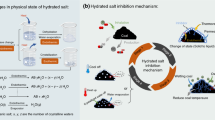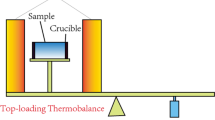Abstract
Simultaneous thermal analysis was used to study the influence of Vitamin C as possible chemical additive inhibiting coal oxidation process at low temperature. Some oxidation characteristics of Vitamin C affecting the coal oxidation were investigated at different heating rates. The TG-DSC data show that the impact of Vitamin C on coal oxidation process can be directly evaluated using ignition temperature and critical temperature. Comparison with the effect of water on coal oxidation shows that Vitamin C is more efficient than water. However, the blank experiment conducted with inert α-Al2O3 also suggests that Vitamin C can decompose at about 200 °C, which limits the usage of Vitamin C on inhibiting coal oxidation.
Similar content being viewed by others
References
Wang H H, Dlugogorski B Z, Kennedy E M. Analysis of the Mechanism of the Low-temperature Oxidation of Coal[J]. Combust. Flame, 2003, 134: 107–117
Mao J D, Schimmelmann A, Mastalerz M, et al. Structural Features of a Bituminous Coal and Their Changes during Low-Temperature Oxidation and Loss of Volatiles Investigated by Advanced Solid-State NMR Spectroscopy[J]. Energ. Fuel, 2010, 24: 2536–2544
Wang H H, Dlugogorski B Z, Kennedy E M. Coal Oxidation at Low Temperatures: Oxygen Consumption Oxidation Products, Reaction Mechanism and Kinetic Modeling[J]. Prog. Energy Combust. Sci., 2003, 29: 487–513
Taraba B, Peter R, Slovak V. Calorimetric Investigation of Chemical Additives Affecting Oxidation of Coal at Low Temperatures[J]. Fuel Process. Technol., 2011, 92: 712–715
Watanabe W S, Zhang D K. The Effect of Inherent and Added Inorganic Matter on Low-temperature Oxidation Reaction of Coal[J]. Fuel Process. Technol., 2001, 74: 145–160
Sujanti W, Zhang D K. Investigation into the Role of Inherent Inorganic Matter and Additives in Low-Temperature Oxidation of a Victorian Brown Coal[J]. Combust. Sci. Technol., 2000, 152: 99–114
Dou G, Wang D, Zhong X, et al. Effectiveness of Catechin and Poly(ethyleneglycol) at Inhibiting the Spontaneous Combustion of Coal[J]. Fuel Process. Technol., 2014, 120: 123–127
Slovák V, Taraba B. Urea and CaCl2 as Inhibitors of Coal Lowtemperature Oxidation[J]. J. Therm. Anal. Calorim., 2012, 110: 363–367
Singh A K, Sahay N, Ahmad I, et al. Role of Inorganic Com-pounds as Inhibitor in Diminishing Self-heating Phenomena of Indian Coal[J]. J. Mines Metals Fuels, 2002, 50: 356–359
Xu Y, Wang D, Wang L, et al. Experimental Research on Inibition Performances of the Sand-suspended Colloid for Coal Spontaneous Combustion[J]. Safety Sci., 2012, 50: 822–827
Zhan J, Wang H H, Song S N, et al. Role of an Additive in Retarding Coal Oxidation at Moderate Temperatures[J]. Proceed. Combust. Insti., 2011, 33: 2515–2522
Yu S, Xie F, Lu C, et al. Oxidation and Inhibition Characteristic of Coal with Different Deoxidization Degree[J]. J. China Coal Society, 2010, 35: 136–140 (in Chinese)
Englard S, Seifter S. The Biochemical Functions of Ascorbic Acid[J]. Annu. Rev. Nutr., 1986, 6: 365–406
Polidori M C, Mecocci P, Frei B. Plasma Vitamin C Levels are Decreased and Correlated with Brain Damage in Patients with Intracranial Hemorrhage or Head Trauma[J]. Stroke, 2001, 32: 898–902
Pospisil J, Klemchuk P P. Oxidation Inhibition in Organic Materials[M]. Boca Raton: CRC Press, 1990
Wang D, Dou G, Zhong X, et al. An Experimental Approach to Selecting Chemical Inhibitors to Retard the Spontaneous Combustion of Coal[J]. Fuel, 2014, 117: 218–223
Author information
Authors and Affiliations
Corresponding author
Additional information
Funded by the National Natural Science Foundation of China(No. 51134020), the Shenhua Group Corporation Limited (No. U1361213), the Priority Academic Program Development of Jiangsu Higher Education Institutions, the Natural Science Foundation of Jiangsu (No.BK20141132) and the Fundamental Research Funds for the Central Universities (No.2014QNB01)
Rights and permissions
About this article
Cite this article
Qin, B., Dou, G. & Wang, D. Thermal analysis of Vitamin C affecting low-temperature oxidation of coal. J. Wuhan Univ. Technol.-Mat. Sci. Edit. 31, 519–522 (2016). https://doi.org/10.1007/s11595-016-1402-z
Received:
Accepted:
Published:
Issue Date:
DOI: https://doi.org/10.1007/s11595-016-1402-z




